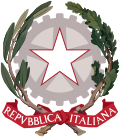| Permanent Representative of Italy to the European Union | |
|---|---|
| Rappresentante Permanente d'Italia presso l'Unione europea in Bruxelles | |
 Emblem of Italy | |
since 10 March 2023 | |
| Inaugural holder | Attilio Cattani |
| Formation | 1958 |
The Permanent Representative of Italy to the European Union is the head of the diplomatic mission of the Italian Republic to the European Union. The post is usually held by an Italian diplomat with the rank of ambassador, who simultaneously serves as the representative of Italy at the European Commission.